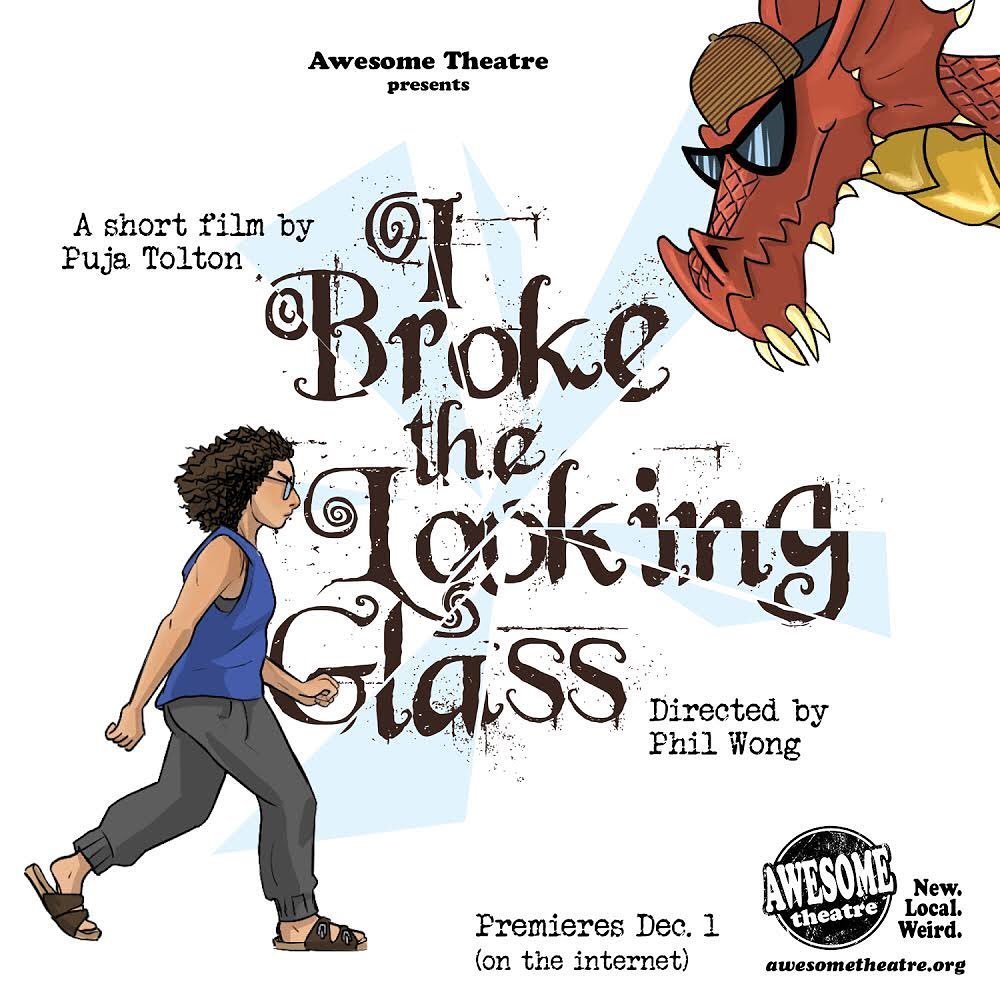As the Bay Area continues to muddle on through a worldwide pandemic, one of the trickier aspects has been finding new words to describe our endless days in lockdown. “Banal” works. “Never-ending” is OK. “A Nietzschean gaze deep into the abyss” seems almost too on-the-nose. But at one point or another, almost everyone has tossed around the term “surreal.”
Fortunately, “surreal” is where Puja Tolton thrives. As a performer, she’s portrayed everything from Shakespeare’s “Midsummer” lovers to a funhouse-mirror parody of a pop megastar with the initials “T.S.” As a writer and illustrator, she specializes in turning the normal into the fantastic, and vice versa: In 2016, she and Emma Craig published the book “Dating Between the Lines: An Illustrated Adventure of Humor and Human Insight,” featuring Tolton’s humorous illustrations of pick-up lines she’s had to endure (the old chestnut “Your butt is out of this world” is illustrated alongside a female astronaut taking off into space).
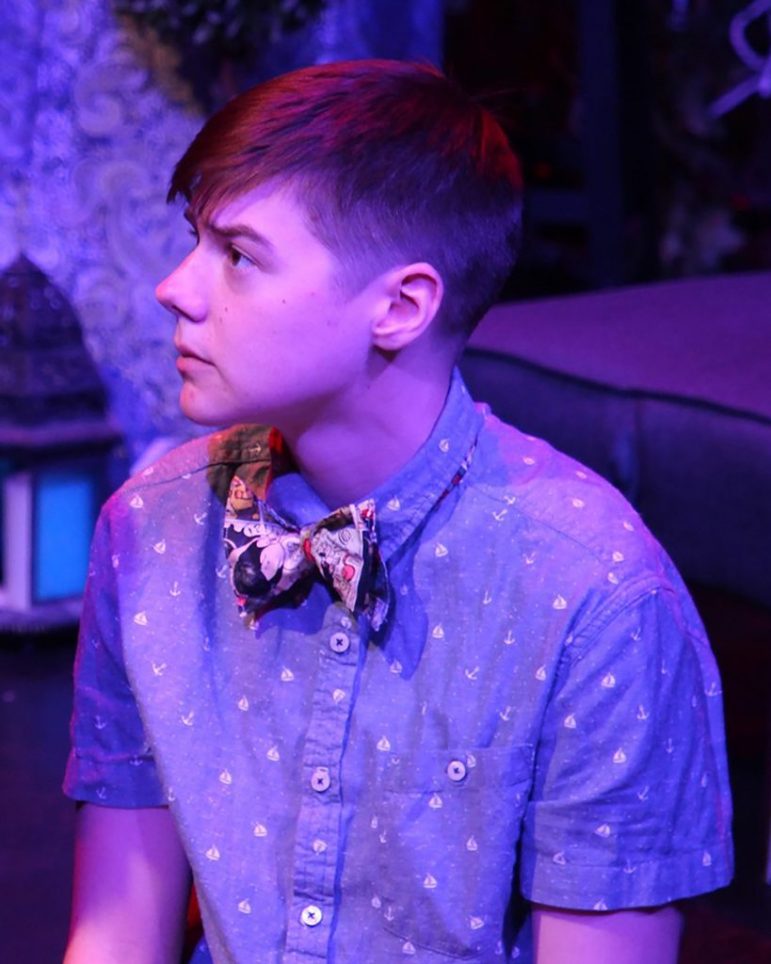
Tolton’s become a staple of the creative team at the equally offbeat Awesome Theatre, where she’s frequently directed, designed and performed (including the aforementioned “T.S.” role in a play about a half-human/dolphin baby). So, it was no surprise that the company named her their 2020 artist-in-residence. This led to the creation of “I Broke the Looking Glass,” the story of Oakland millennial Eddy whose job, housing, and dating woes result in her having a mental breakdown. Then the dragon shows up.
The story, conceived as a play, was meant to open this November until COVID slammed the brakes on all indoor gatherings.
Luckily, the folks at Awesome Theatre proved to be as resilient as they are media-savvy. As such, “I Broke the Looking Glass” was reimagined as a film. Directed by Phil Wong and featuring Alicia Piemme Nelson in the lead, the film boasts credits illustrated by Tolton herself (who also drew the poster and has a co-starring role), as well as puppetry courtesy of Shadow Circus Creature Theatre.
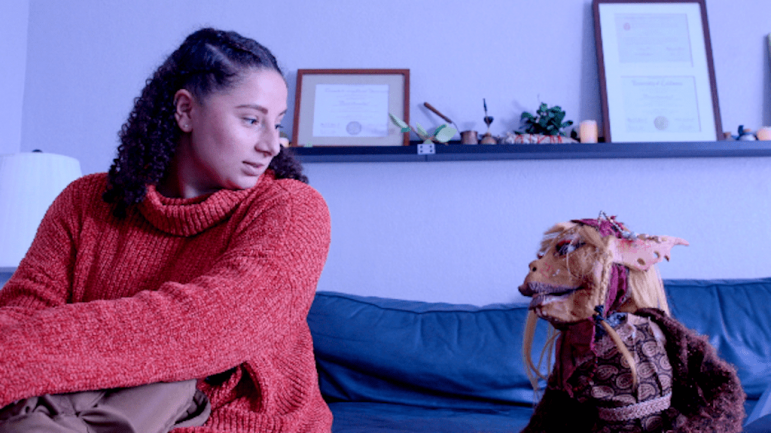
As the crew finished last-minute shooting and editing, I was able to catch a word with Tolton about her love of Oakland, reworking a play for film and how to pull off a film shoot in the age of social distancing.
How have you been holding up creatively and mentally during shelter-in-place?
Puja Tolton: Acting-wise, I’ve done a couple short-form shows with Quicksand Comedy Club and [AmiosWest’s] Shotz! over Zoom. It’s been really inspiring to see the theater community figure out ways to perform while live shows aren’t an option. Still, I do feel a bit of burnout with that kind of work. There’s a disconnect with pacing (of any kind, but especially comedic) when you perform on Zoom. One of my favorite online shows was one I did with Nerd Rage: The Great Debates. That’s with a bunch of comedians, so you know it’ll be fun, and it’s not scripted, which definitely helps.
I’ve been working on [the “I Broke the Looking Glass”] script all year, so that’s also been a huge way for me to stay motivated creatively. This project started as an exploration of my own neuroses, and though it has grown beyond that in a lot of ways, it still has been therapeutic to get it out in the air. I think this year has been really eye-opening to people in terms of their own mental health, and I’m no exception. I won’t lie and say I haven’t had low points — stretches where I had no motivation or felt the weight of all the horrible stuff happening — but I’ve also felt a lot of gratitude for my family, my community and all the people who care about my well-being.
Has any particular pandemic-era form of art caught your eye?
Tolton: I’m not sure if this counts, but I’ve gotten really into Twitch streams during the pandemic. A friend of mine who’s also a playwright, Alandra Hileman, got me into Torpid Gaming Network. They’re Bay Area-based and have a bunch of streams including some very fun TTRPG [table-top role-playing game] actual play sessions. They’re a go-to for me while I’m working on an illustration.
How did you first connect with the motley crew of Awesome Theatre?
Tolton: I believe it was in early 2017? I was invited to perform in Shotz! at the Flight Deck in Downtown Oakland. At that time, I was primarily performing with Ragged Wing Ensemble and knew some folks from Shotz! through them. The piece I ended up acting in was written by Colin Johnson [the artistic director of Awesome Theatre]. It was this silly piece about two women who were up for an acting award running into each other in the bathroom before the winner was announced. We immediately clicked over a shared love of absurd comedy. After that, they invited me to perform in a playwriting competition they were running, and the rest is history.
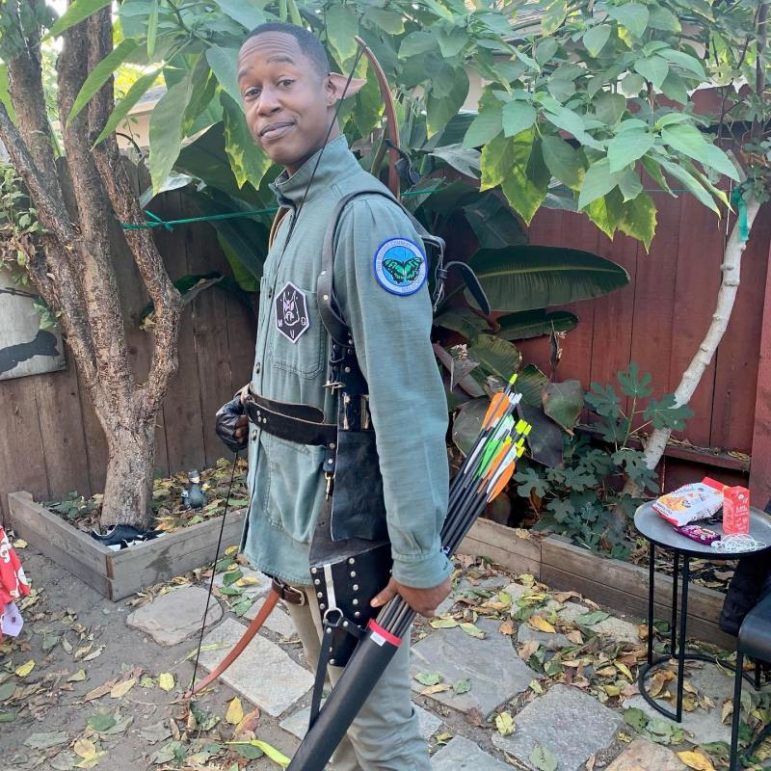
They being a theatre company, how did they respond to your resident artist pitch being a film?
Tolton: Actually, it was originally supposed to be a play! I pitched it pre-COVID, and we had every intention of performing it live in front of an audience. Once COVID hit, that obviously came into question. We talked it over throughout my writing process, but eventually we decided that the safest thing was for us to transition it into a film project. Thankfully, Awesome Theatre is already great at filming, as they often include filmed segments in their live shows. It actually ended up being a boon when it came to the more fantastical elements in the film: Some of the makeup and prosthetics wouldn’t have been possible in a live performance, and we’ve been having a lot of fun leaning into the medium in general.
The title ‘I Broke the Looking Glass’ seems to suggest a Lewis Carroll influence, and the synopsis is reminiscent of Dorothy in Oz. What inspired you to write a story wherein Oakland becomes your personal Wonderland?
Tolton: The transformation of Eddy’s environment is a direct result of her mental state. I wanted to use that tried-and-true plot point of a character falling into a fantasy world — Narnia is another good example — to talk about someone coming to terms with and learning to live with their mental illness. Both Alice and Dorothy get tidy endings, they go back to their old life at the end of their stories, but a lot of the time when we experience trauma or a breakdown of some kind that isn’t really an option. We have to learn to live with our new circumstances. How do you take those small, but necessary steps?
Oakland has been my home for the past six years, and I wanted to feature it in a big way. I love it here! It’s one of my favorite places in the world, and it has an enormous amount of history and culture that could enrich any story. [Director] Phil Wong also had a lot of great input in terms of how and why we should go about including it. As someone who was born and raised in Oakland, he wanted to make sure that we weren’t just including it as a fun backdrop for our fantasy film; that it should be an intrinsic part of the plot. As much as this is a personal story about one woman’s mental health journey, it’s also about how she interacts with her environment and the people around her. Oftentimes, when we are experiencing a moment of crisis, we self-isolate. Part of how Eddy shows growth and begins to heal is through taking a more active part in her community.
Have you been to Children’s Fairyland in Oakland?
Tolton: No! I’m too old! [laughs] I have gotten peeks of it while at Lake Merritt though, and it looks magical! I’d love to check it out at some point.
As much as the story seems to acknowledge classic fairy tales, the synopsis suggests a subversion of them as well. How valuable do you think those stories still are in a ‘woke’ world?
Tolton: Though the title does suggest a fairy tale, I think the film itself is more inspired by high fantasy and modern nerd culture, particularly “Lord of the Rings” and “Dungeons and Dragons.” I think those sorts of stories and games are extremely valuable. It can provide an escape in a dark time, but it also can help you grapple with real-life issues. My favorite fantasy novels and comic books don’t just include incredible lore and magic systems, but talk about aspects of the human condition. Just like other forms of storytelling, I think that should always have a place in our society.
All that being said, I think it’s also important to recognize that high fantasy doesn’t have a great track record when it comes to issues of race and inclusivity. As a fan of the genre, it was important for me to acknowledge that and, as you said, subvert it in this film. On a broader level, I think the more inclusive we are — who’s writing these stories, who’s telling them, who’s designing these games, etc. — the better we’ll all be for it. There are a lot of really incredible BIPOC and LGBTQ+ fantasy writers and game designers who have already put out work that should be praised. Octavia Butler, Ta-Nehisi Coates, N.K. Jemisin, Nnedi Okorafor, and Neon Yang are all fantastic authors who have moved the fantasy genre forward, to name just a few.
Does collaborating with the manic creations of Shadow Circus just add to the ‘bite’ of the film?
Tolton: Yes, they’re amazing! One of the first things I included in my pitch was that I needed puppets in the project. Phil was the one to suggest collaborating with Shadow Circus, and it’s been a match made in heaven! All of their puppets have a charm, creepiness, and humor to them that helped us solidify the film’s tone.
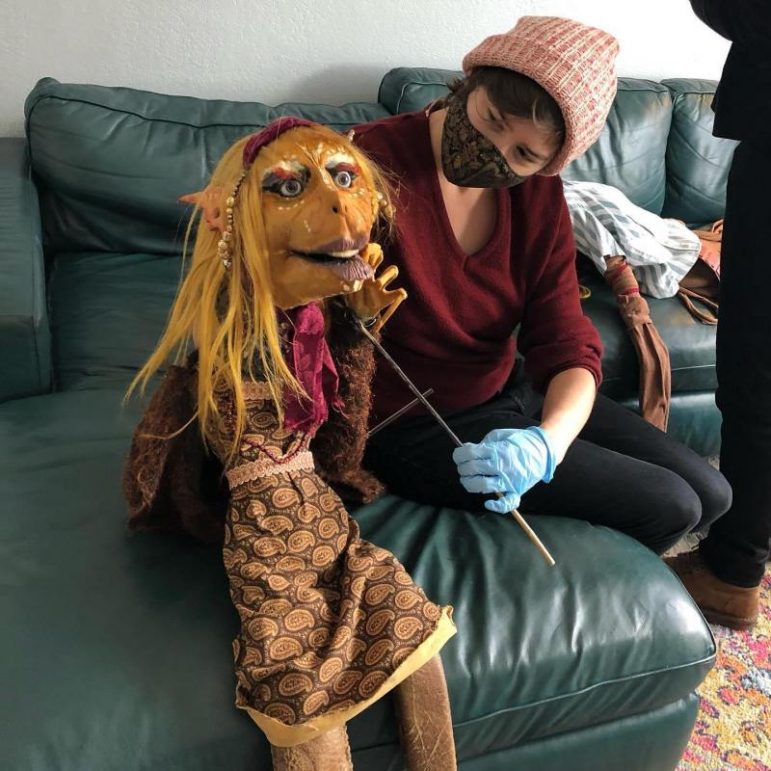
Are the puppets part of Shadow Circus’ usual stable or newbies?
Tolton: All of our puppets are from the usual stable, but Phil and I did get to do some casting. It was hard to pick because all of them are so so good! We fiddled around with some of their costuming in order to fit with our own modern fantasy vibe, but it really was a very easy process. Each puppet has so much individual personality, and I think their presence really enriches the world we built.
Do they make the film less kid-friendly or more?
Tolton: Definitely depends on the kid. I’d say this film is fine for older kids, but the subject matter is certainly adult. We deal with heavy topics in what I hope is a light and compassionate way. What I’m trying to say is, I don’t think the puppets will be what gets us our PG-13 rating. [laughs]
So … how does a shoe-string-budget indie film shoot during a pandemic?
Tolton: Very carefully. A big thing going into this project was setting up very specific safety measures for our shoots. We knew that if we were going to make this film right now that our first priority would have to be keeping our cast and crew safe. Phil and Claire Rice [the artist-in-residence program director] teamed up to put together a truly solid document going into filming (building off of guidelines put together by TheatreWorks).
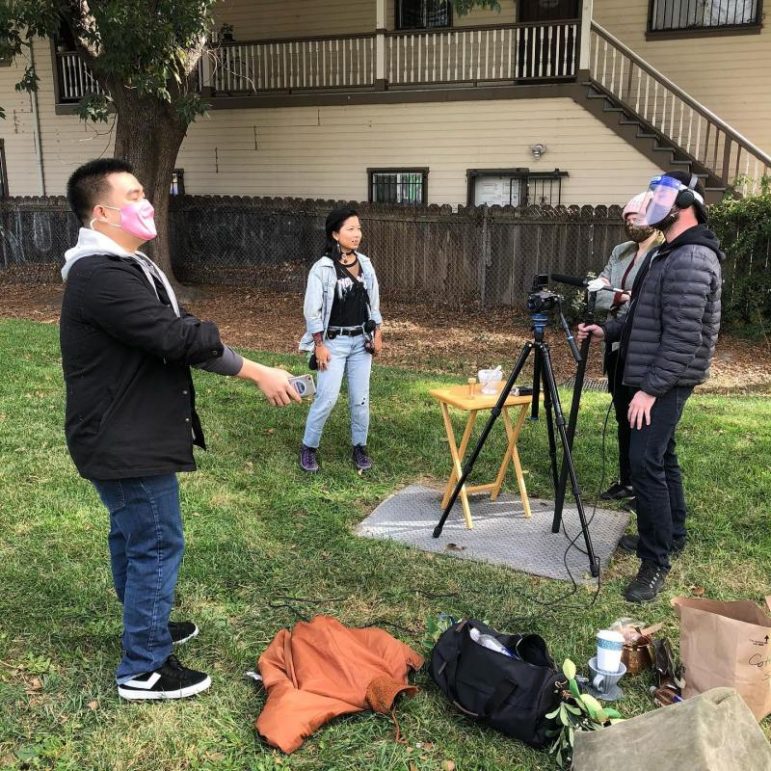
Has it handcuffed you and the crew or inspired you to be more creative?
Tolton: We’ve definitely had to come up with creative solutions to accomplish different effects, but green screen and clever editing can get you a long way. I’ve always enjoyed creative problem-solving, and I think that can be where the most exciting choices are made. Everyone has been very understanding and vocal about their needs and concerns and Phil has been a great guiding force through it all.
Although there are only five (non-puppet) cast members, that cast is incredibly diverse — with a varied set of ethnic and gender identities (including an Asian-American director). Was that casting written in, or did auditions just lean that way?
Tolton: It was certainly an active choice on our part, though I think the credit for those decisions should go primarily to Phil and Nikki Meñez [Awesome Theatre’s casting director]. Phil really pushed for diversity when he came onto the project, and Nikki had a huge part to play in that as well. The script includes a queer romance and gender non-conforming individuals, and it was really important for me to make sure the people we cast reflected the characters and the story we were telling.
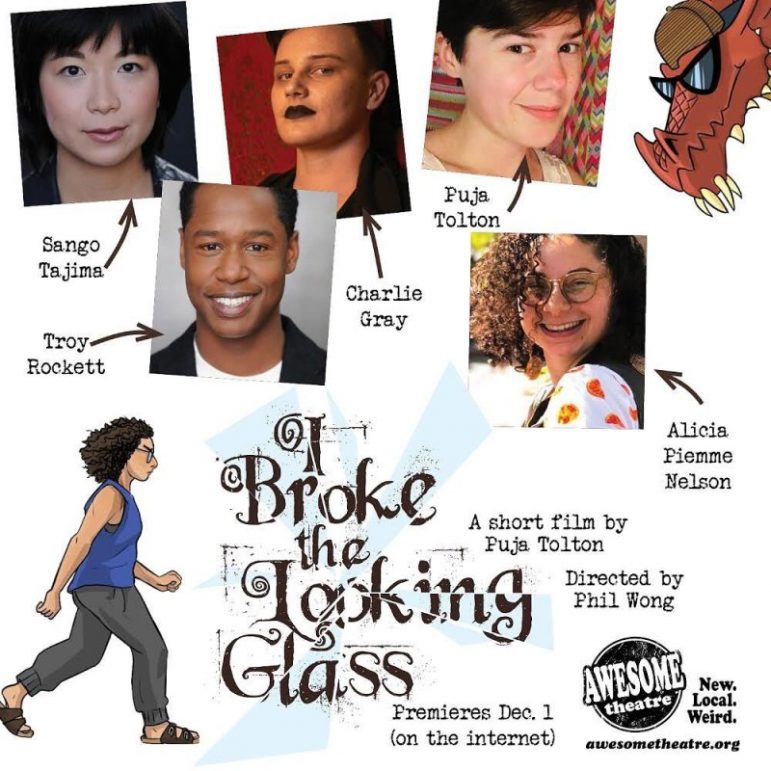
In light of this summer’s infamous “Living Document” which called out Bay Area theater companies (including Awesome Theatre), did you or Awesome feel any obligation to better commit yourselves to better inclusivity?
Tolton: Certainly. I was in the middle of writing the script when that came out and Awesome Theatre had a long conversation with me about the document, their role in it, and what steps they were making to address the issues brought up in it. I don’t want to speak for them too much, but I know that they have set up very specific and quantifiable guidelines for themselves in terms of diversity and inclusion that they are committed to following moving forward. A large part of that is casting and hiring practices, but beyond that, they have begun to and are in the process of setting up structures for people to come forward if they ever experience an aggression or harassment of any kind. You can see their full statement on equity and accountability on their website.
For myself, this is by far the most creative pull I’ve had on a production with a theater company. I’ve primarily worked as an actor where my viewpoint may have been respected, but I didn’t necessarily have any deciding power. The Living Document — and working on this production — has solidified for me that not only do I need to use what power I have to cultivate a safe environment where BIPOC voices are heard and amplified, but that I need to feel comfortable stepping back so they can take center stage.
The film is described as “a love letter to Oakland.” With or without the pandemic, is there any Oakland event you’d love to do but haven’t been able to recently?
Tolton: So many! I think the thing I’m missing most right now are Oakland’s queer dance parties. Starline Social Club, Hella Gay at the Uptown, how I miss thee!
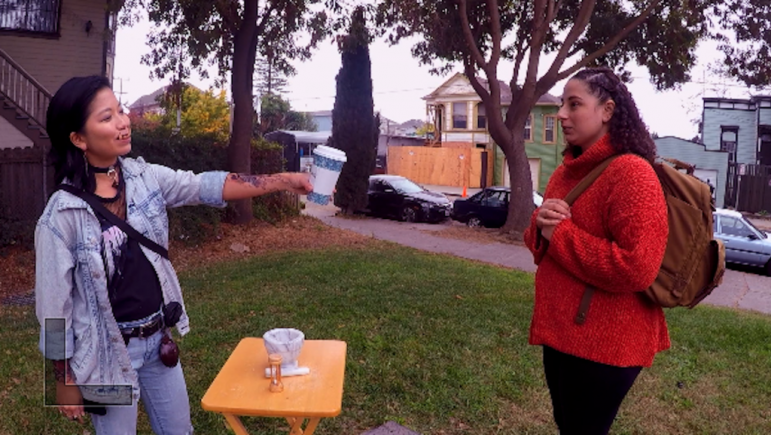
Is this film a one-shot story or something you could expand upon?
Tolton: I see this as a self-contained story, but I could definitely see myself adapting it to another medium — a graphic novel perhaps or putting it onstage when we can do live theater again. We shall see!
What’s next for you, project-wise?
Tolton: I’m doing a staged reading over Zoom with The Moonrisers on Dec. 2 and 3 as part of PlayGround’s Innovators Showcase. The play is called “Baboons in the Nighthouse” and is a wonderfully twisted meta-narrative of a theater company doing a staged reading over Zoom and slowly falling apart in the process.
And finally: Who’s your favorite fictional dragon?
Tolton: I know this is a little cliché, but I think I’m going to have to go with Smaug. I grew up on “The Hobbit,” and Smaug is such a classic example of what makes dragons great. Riddle contests! Arrogance! Majesty! A giant horde of treasure! What’s there not to like?
* “I Broke the Looking Glass” begins streaming 7 p.m. Dec. 1 on the Awesome Theatre website. The stream is pay-what-you-can, with a $10 suggested donation. The film is directed by Phil Wong, written by Puja Tolton, and stars Alicia Piemme Nelson, Charlie Gray, Puja Tolton, Sango Tajima, and Troy Rockett. Puppets characters were created by Shadow Circus Creature Theatre. The film’s soundtrack is performed by Suits of Steel.
